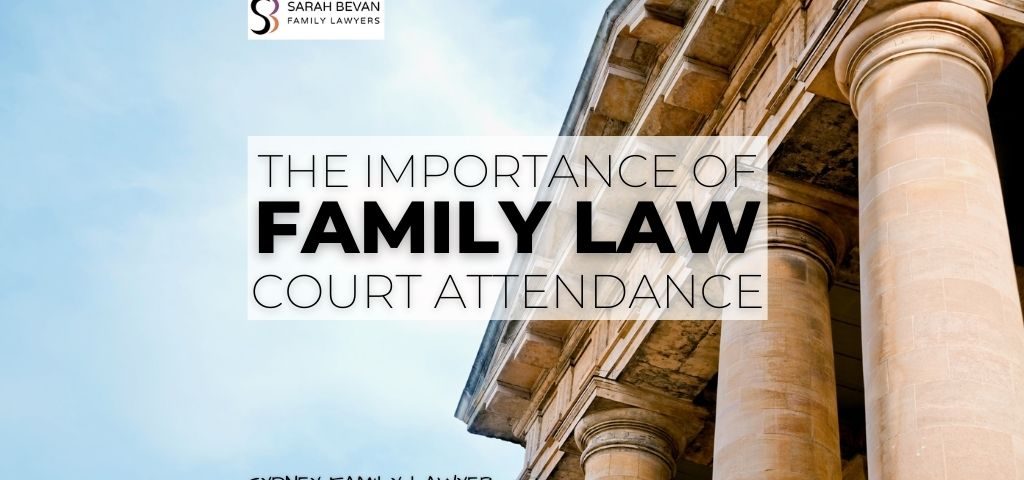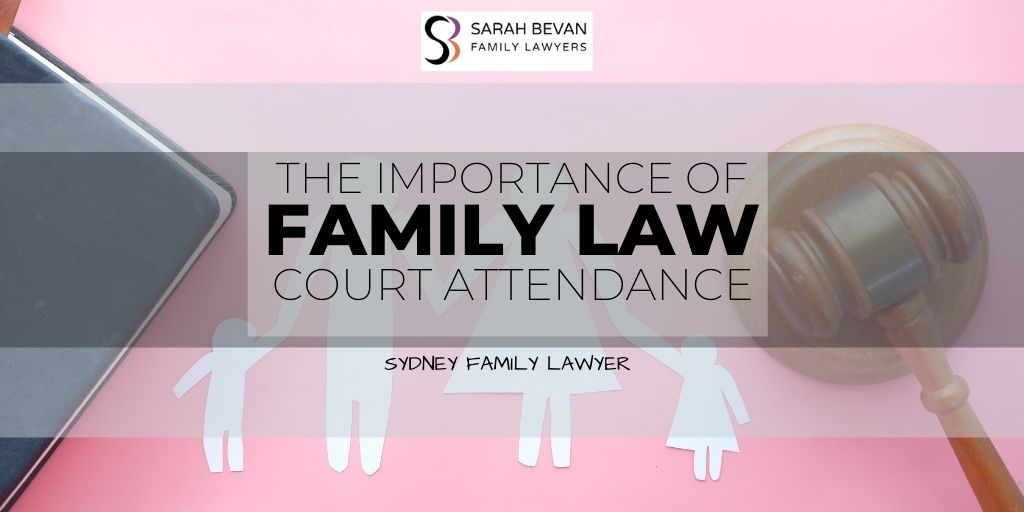- Sydney Family Lawyers
- (02) 9633 1088
- mail@sbfamilylawyers.com.au
The importance of Family Law Court attendance
The importance of attending Family Law Court
When you ask people who have gone through family law proceedings, they will often tell you that it was one of the most stressful, overwhelming and worst part of their lives. And they would be right. Family law is incredibly complex and it can affect your life for many years to come, so ensuring that you are properly equipped is critical whether that means with sufficient evidence, legal representation or practical knowledge of the court system.
At Sarah Bevan Family Lawyers, we have compiled a list of commonly asked questions from clients about court.
They are:
• Where do I have to go? Will I have to attend Court physically, or can I attend by phone?
• What do you wear?
• What do I have to say to the judge?
• Do I need a lawyer?
• I don’t know if I can afford going to court. What can I do?
• Will I have to face my former partner?
• Should I take the kids to Court?
• What happens if I don’t go to Court?
• Do court dates change?
1. Where do I have to go? Will I have to physically attend Court, or can I attend by phone?
In recent years, prior to the global pandemic, the typical answer lawyers would give to clients was – yes, you have to physically attend the Court and appear before the Judge or Judicial Registrar. Parties were only given permission to attend by telephone if they had filed the appropriate request form, which generally required giving the Court a reasonable excuse as to why they could not attend.
Since COVID-19 the Court received an overhaul of its, some would argue, pre-historic IT capabilities and began conducting cases through telephone and MS Teams, which is similar to Zoom (and other video-based conferencing systems). This has drastically assisted parties who struggled to find alternate care arrangements for their children or could not take the time to physically attend court for one reason or another.
Of course, attending Court hasn’t completely gone away. Some court events are now in person (when restrictions don’t apply) and some are still by phone or MS Teams.
2. What do I wear to court?
While there is no set rule or strict dress code for parties, it is generally expected that parties attend Court (even if it is by MS Teams) to dress in business-like attire.
3. What do I say to the judge in court?
If you have a lawyer, you don’t have to say anything to the judge. Your lawyer will speak on your behalf.
However, if you are self-represented, then you will need to speak to the judge. When addressing a Judge, you say, “Your Honour” and before a Judicial Registrar you say “Registrar” (Depending on if you are before a Judge, Judicial Registrar or Senior Registrar).
4. Do you need a lawyer? Is there any real benefit?
You are not required to have a lawyer, and you can represent yourself at Court.
However, the decisions made in a family law matter can have a wide-reaching effect on your life. Skilled legal advice and representation can have a profound effect on you, your case and your family.
5. I don’t know if I can afford to go to court. What can I do?
Going to court is an expensive exercise, both emotionally and financially draining. However, at Sarah Bevan Family Lawyers we understand the financial and emotional toll court has on clients. That is why we focus our attention on resolving your matter outside of court for example attending mediation.
Resolving your matter outside of court will save you countless dollars (and likely a few therapy sessions) and it means you and your former partner can reach a decision together, rather than have a judge make the decisions for you. If you would like to talk about mediation, or indeed want to attend mediation, please contact Sarah Bevan and Aboorva Sundar who are both nationally accredited mediators and can give you a mediator’s insight on how best to resolve your matter.
If court is your only option and you are struggling financially, then you can look for legal aid, litigation funding or enter into a payment plan. These are all things that we can offer at Sarah Bevan Family Lawyers and are happy to discuss with you.
6. Will I have to face my former partner in court?
If you are attending Court in person, you will likely see your former partner at Court. Where there is a history of domestic/family violence, you can contact the Court and notify them about any concerns you may have. The Court will then enact a safety plan for you.
7. Should I take my kids to Court?
No, Court is not an appropriate place for children to be present. If you are required to physically attend Court, ensure that the children are looked after by a trusted friend or family member. If Court is by telephone or MS Teams, please ensure the children are not around and cannot hear the proceedings. Remember that the legal dispute may well be about them, but they need to be protected from the adult issues involved.
8. What happens if I miss Court or just don’t go?
You should always go to Court, or if you cannot attend, ensure that you are legally represented and your lawyer can attend Court on your behalf. If you do not attend Court, then a Judge or Judicial Registrars can make orders in your absence. If you continue not to attend Court, then your matter will be listed for an undefended hearing. Should that occur, the other party may get most (if not all) of the orders they seek granted.
If you are aware that orders have been made in your absence, then we recommend that you urgently contact the court and obtain a copy of the orders. Once you have a copy, you should make an appointment with a family lawyer and get advice about what those orders mean for you.
If you know you cannot attend Court, and you do not have a lawyer, you can seek an adjournment in order to get one.
9. Do court dates change?
Yes, quite frequently, in fact. Court dates are always subject to the judicial calendar. You will find your court date on the orders which are given to the parties. In some cases, those court dates will change, and you should always be checking your emails from either your lawyer or the Court itself.
You can always access your file and see when your court date is listed, on the Commonwealth Courts Portal. There you can see all the previous orders, documents filed and when your matter is next listed at Court.
If you or anyone you know is going through a family law separation, please contact one of our specialist family lawyers at Sarah Bevan Family Lawyers who can assist you in resolving your family law matter.




